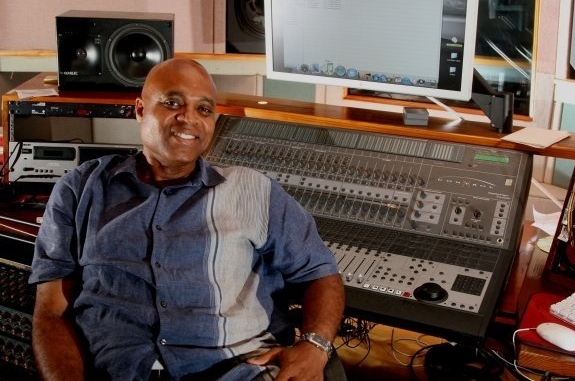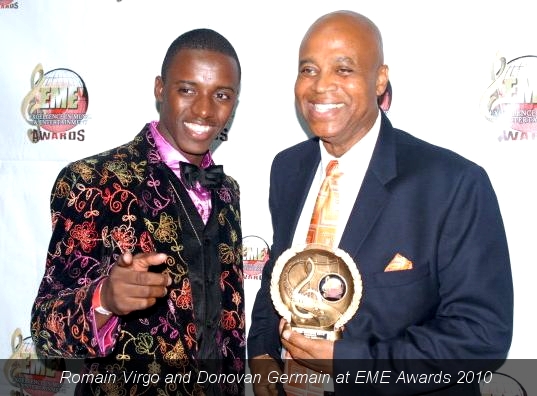Articles about reggae music, reviews, interviews, reports and more...
Interview: Donovan Germain
- Home
- Articles
- Interviews
- Interview: Donovan Germain

Interview: Donovan Germain
"My plans are to try to save the music"
Sampler
Penthouse Records has been ruling over the dancehall for 20 years. The quality of its productions quickly enabled him to achieve an impressive number of hit singles and to become one of the most important labels in Jamaica. Donovan Germain looks back at the history of his label.

You were only 20 when you started your record shop in New York. Where does your love for music come from ?
I was born on Nelson Road in Whitfield Town, Kingston 13. My neighbour had a sound system by the name of El Toro, he played the sound almost every day, thus began my love affair with music.
Can you tell us a little more about your first labels - Rub a Dub, Reggae, Revolutionnary Sounds and Germain Records - before Penthouse ?
My first labels were actually a quest for identity.
Why did you give up roots productions and moved to digital music during the 80s ?
I did not give up roots produtions, it was really evolving, learning other forms of my music. I was also moving with the evolution of the music.
Could you explain us the origin of your label's name ?
The studio was on the top floor of the building, hence the name Penthouse.
Penthouse productions always had a specific sound, a kind of futuristic and unclassifiable sound. How can you explain that ? Was it a way to be different from the other Jamaican producers, considering the competition was really harsh ?
Coxsone Dodd was my idol, you knew his sound anywhere you heard it. I wanted that kind or identification too.
About Coxsone, you realized brilliant relicks of Studio One riddims. How did you chose these riddims ?
I grew up listening to Studio One songs. I just lick the ones I feel the most at the time I am recording.
How do you know that an original riddim could become a nice digital riddim ?
I guess that's my gift. I have no formula.
You're close friends of Gussie Clarke (Music Works and Anchor labels) and Patrick Roberts (Shocking Vibes) whose recording studios were not far from yours ?
Gussie was instrumental in my entry to the professional part of the music business. We went to the same high school. I learned the art of producing from Gussie and Lloyd Campbell of Spiderman and Joe Fraser labels. For Patrick Roberts, I extended the same courtesies as Gussie did for me, he also had unlimited access and credit facilities at my studio.
Do you have good relationships with other producers ?
I try to maintain an amicable relationship with my peers.
Can you tell us more about your various activities (recordings, studio, distribution, management) ?
My first love is production. I enjoy the birth of an idea in my head and watch the manifestation of the idea and the acceptance by the public. In order to facilitate my work I had to have my own studio. I always had problems with studio time before I had my own studio. Now I have an idea, I can work on it immediately, no waiting two weeks to get into a studio. I went into management because the artists I was recording needed that kind of assistance. They represented the label so I had to see to it that they represented well and got what was due to them. In the process they had a better understanding of the business aspect of the industry. I was actually into distribution before I became a producer. I distributed for Gussie, Lloyd Campbell and Sonia Pottinger while I lived in New York.
Penthouse fans generally think that your label has two major periods. The first period represented by your collaboration with Dave Kelly in the early 90s. The second period represented by your collaboration with Lenky in the early 2000s. How did you start working with them ?
I dont agree with the two periods of the label. The first period with Dave and Tony Kelly was really interrupted by my entrance to the management aspect of the business and the breakout of Buju Banton, Tony Rebel and Wayne Wonder. I had to spend considerable time away from the studio, which resulted in less releases but more international recognition of the label with 2 grammy nominations to boot. When I had established the proper structure around the artists I started to develop new talents, like Jah Mali, in the early 2000 as you call it. People will say there is a resurgence of the label again. This is because I am spending more time in the studio and developing new acts again like Romain Virgo, Cameal Davis and Torch.

Can you tell us a little bit more about Dave Kelly and Lenky ?
I met Dave Kelly when I used to record at Tuff Gong. He was always touching the outboard gear in the studio while I was working, that impressed me and I told him I was gonna build a studio and make him my engineer. Dave was the engineer who tried to be a musician and in the process found this infectious groove. Lenky is the consumate musician, always seeking new sounds always buying the latest keyboard and always practicing. Lenky had the uncanny ability to interpret my ideas and make them sound better than I envisioned them.
Many artists like Buju Banton, Beres Hammond, Tony Rebel or Marcia Griffiths have been recording for you for more than 15 years. How can you explain they remained faithful to you during all these years ?
All my artists are with me for extended periods because we are friends outside of the studio, our relationships transcends music. We visit each others homes and we make great music together.
It looks like your label is a kind of training center. Many people who worked with you, engineers and musical producers (like Dave and Tony Kelly, Andre Tyrell or Lenky) or artists (like Buju Banton or Tony Rebel) have created their own labels afterwards. Do you think you have an influence in their production training ?
I definitely have great influence on their productions, I taught them all.
Among all your productions, which riddim and which album is your favorite ?
I have no favorites, they are all my creations.
Tell us about your new studio built in 2006 on Ballater Avenue.
It's totally digital and I am loving it, wish I had done it 10 years ago.
Shane C. Brown told me that the studio is equiped with protools HD and uses Tannoy and NS10 speaker monitors.
Yes, that's right.
Tell us about your new engineers team ? Michael "Coolie" Cooper is still here but you work now with Shane C. Brown and Kevino "Bunu" Elliott. How did you get connected ?
I Met Bunu through Assassin and loved his spirit. He is committed to his craft. Coolie has been with Penthouse 16 years now. I know Shane's father Errol very well, he was my mixing engineer in the early 80s. I made contact with him 2 years ago and he started to mix for me because I think that he had a good sound in his mixes. He decided to start his own company so I gave him some office space at Ballater avenue.
Some of the upcoming Penthouse artists have participated to talent contests like Romain Virgo (2007 Digicel Rising Stars winner), Cameal Davis (2008 Digicel Rising Stars winner) or Nikkiesha Barnes (2006 Digicel Rising Stars 2nd). Is it a choice ?
Yes it is a choice. The jamaican public gave them a platform, so I want to take them to another level.
Some words to describe them ?
Talented, discipline, good work ethics. The same words for all of them. It's the early stage of their development so that's all I can say about them at this point.
How a reggae producer can make money in these tough economical times ?
Can't make any money from production, hence managing of the artists.
To conclude, what are your plans ?
Try to save the music.
Conducted in February 2010 for penthouserecords.free.fr
Read more about this topic
Comments actually desactivated due to too much spams
Browse by categories
Recommended Articles
Latest articles
Recently addedView all
© 2007-2026 United Reggae. All Rights Reserved. Reproduction in whole or in part is prohibited. Read about copyright
Terms of use | About us | Contact us | Authors | Newsletter | A-Z














